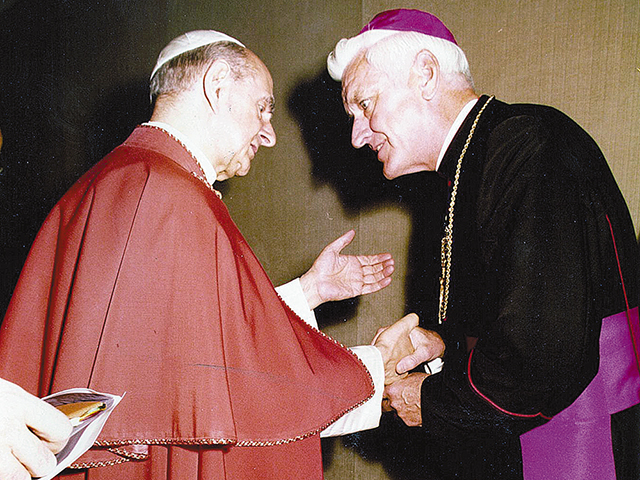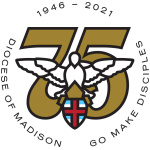
Sixteenth in a series on the 75th anniversary of the Diocese of Madison
The Second Vatican Council had a profound impact on Madison’s second bishop, Bishop Cletus F. O’Donnell.
Bishop O’Donnell attended all four sessions of the Second Vatican Council. He said that implementation of the council was his main concern as Bishop of Madison.
In an interview with this writer published in the Catholic Herald in 1985 on the occasion of his 25th anniversary as a bishop, Bishop O’Donnell said that the Second Vatican Council was “the greatest experience of my life and still continues to be.” He added, “It was a wonderful learning experience. It gave me a sense of the universality of the Church, of the different cultures and divisions.”
The council gave more autonomy to bishops’ conferences throughout the world.
After he came to Madison from Chicago, Bishop O’Donnell continued to be active in the National Conference of Catholic Bishops (NCCB), serving as chairman of the Bishops’ Liaison Committee with Major Superiors of Religious Men, chairman of the Bishops’ Committee on Canon Law, and chairman of the National Catholic Educational Association.
Role of the bishop changed
Bishop O’Donnell said the role of the bishop was changed by the Second Vatican Council.
The bishop was to be considered more of a pastor than an administrator.

“That means that instead of having everything come from the top down, the bishop stands in the midst of his people as one who serves,” he said.
Bishop O’Donnell liked to quote Pope Paul VI in an address he gave to the Italian bishops in 1969.
The pope said, “It was possible for the bishop of yesterday to be reserved and defended by his authority. He could exercise his office — all the time keeping a certain distance from his clergy and people. He cannot do this today. The bishop is again father, pastor, brother, friend in the midst of the people of God. Relations with him must be easy and possible to all.”
There were two key principles guiding the bishop in the post-conciliar Church, said Bishop O’Donnell.
The first is shared responsibility. That means that the bishop himself is not solely responsible for the life of the Church. Priests, Religious, and lay people all have important roles to play.
The second is the principle of subsidiarity. That means that what can be done at a lower level should be done there.
Implementing the principles of Vatican II
Bishop O’Donnell put these two principles into effect in the Diocese of Madison.
He was pleased that Bishop William P. O’Connor had established a Priest Senate in the Diocese of Madison in 1966, perhaps one of the first in the country.
The senate was seen by Bishop O’Donnell as “one of the most essential keys to an effective implementation of Vatican II.”
Bishop O’Donnell also noted that Pope Paul VI had called for the establishment of a pastoral or diocesan council in every diocese composed of laity, Religious, and clergy.
“I definitely do think that these pastoral councils are absolutely necessary to fulfill the intention of the Fathers of Vatican II,” he said.
Bishop O’Donnell did establish a Diocesan Pastoral Council, along with the Priest Personnel Board, Office of Conciliation and Arbitration, Board of Education, and Liturgical Commission.
The bishop also mandated the establishment of parish councils throughout the diocese. All of these bodies were relatively new in the Church to help facilitate shared decision-making.
More on Bishop O’Donnell’s accomplishments will be included in the next article in this series.
Sources: Building Our Future in Faith: Commemorative History of the Catholic Diocese of Madison (1996); archives of the Catholic Herald newspaper.
Mary C. Uhler served on the staff of the Catholic Herald-Diocese of Madison for almost 47 years, the last 34 years as editor. She retired in July of 2020.

